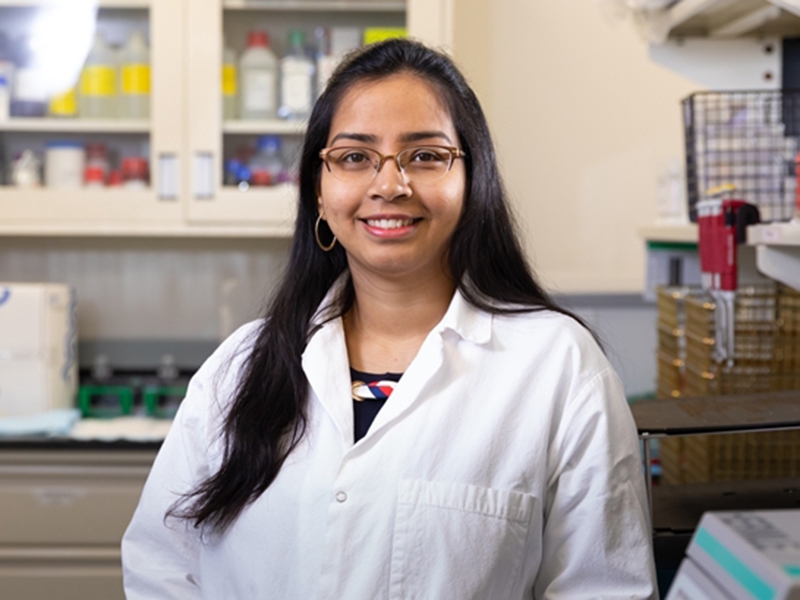Biomedical Researcher Seeks to Improve Outcomes in Stem Cell Treatments
Stem cell therapy has shown incredible promise in the treatment of diseases, injuries and genetic defects. Unfortunately, outcomes can be unpredictable, with stem cell treatments sometimes working and other times resulting in no benefit to the patient for reasons doctors can't determine.
Rebekah Samsonraj, an assistant professor of biomedical engineering, has made the study of stem cells her life's work, and her latest goal is to improve the quality of mesenchymal stem cells (MSCs) biomanufactured for medical treatments, particularly in regenerative medicine. She would like to see a future where stem cell quality improves to the point that cell therapies are 100% effective.
"When we start with the right ingredients, we will end with the right product. What I'm doing is putting in best quality stem cells and helping physicians and patients along the way to be guaranteed that their treatment will work. I want to see improved patient outcomes," she said.
Samsonraj recently received her largest research grant to date, nearly $1 million, from the National Institutes of Health (NIH) through the multidisciplinary Center for Musculoskeletal Disease Research, which is a Center of Biomedical Research Excellence (COBRE). She is the principal investigator and project leader for the five-year study, "Noninvasive Preconditioning of Mesenchymal Stem Cells to Improve Potency for Bone Repair," to research improved stem cell preparations for clinicians to use as cell therapies for bone repair and regeneration.
College of Engineering Dean Kim Needy congratulated Samsonraj on this significant funding to push her research forward.
"It's inspiring to think that the stem cell research of today will mean groundbreaking advances in the health care of tomorrow," Needy said. "Dr. Samsonraj has shown incredible focus, patience and compassion in pursuing the difficult work of improving on the promise of stem cell treatments."
Samsonraj explained that stem cells can be used as "living drugs" to treat multiple disorders. But sometimes there is a lack of efficacy and potency in the stem cells that lead to compromised results. In these cases, the stem cells don't cause harm, but they don't perform as expected or have no effect.
"We are looking to solve this problem by fine-tuning the cell quality using innovative methods in the lab," she said. "Solving this issue is key to successful cell therapies with predictable and guaranteed outcomes."
Samsonraj submitted preliminary evidence to NIH showing that her methods of preconditioning result in MSCs with improved potency. The latest research will focus on generating best-in-class cells for cranial bone repair, which could address a genetic defect or a traumatic head injury.
Focusing her current research on bone repair makes sense because it regenerates more quickly than other tissues and allows for a better understanding of the functional quality of MSCs as they aid in tissue healing.
"If we can fine-tune stem cells to help repair defects in the skull and regenerate the tissue, that will have very broad applications," she said, mentioning the regenerative potential of MSCs for other unmet clinical needs in skin, heart, lung and nerve repair.
Samsonraj previously received a patent based on her research to identify individuals who are good candidates to be stem cell donors. Her goal is to patent breakthroughs from this latest research once findings on her preliminary success are substantiated.
Samsonraj directs the Cell Therapy and Biomanufacturing Research Laboratory at the U of A. She joined the faculty of the Biomedical Engineering Department at the university after completing postdoctoral studies at Mayo Clinic in Rochester, Minnesota, and serving as assistant professor of medicine at the Mayo Clinic College of Medicine and Science. She earned her Ph.D. in bioengineering at the National University of Singapore.
Topics
Contacts
Rebekah Samsonraj, assistant professor
Department of Biomedical Engineering
479-575-8640,
rmsamson@uark.edu
Jennifer P. Cook, director of communications
College of Engineering
479-575-5697,
jpc022@uark.edu
Headlines
Record U of A Graduating Class Will Provide Positive Impact Across Arkansas
A record number of U of A graduates means a record number of highly motivated, talented, work-ready people starting their careers in the Natural State.
Industrial Engineering Students Recognized With Department Awards and Scholarships
The Department of Industrial Engineering recognizes students with honors and awards at the annual Industrial Engineering Student Awards Banquet in April.
Black and Reeder Scholarship Recipient to Study Biomedical Engineering
Jackson Hudnall has been named this year's recipient of the Black and Reeder Scholarship, which is awarded to a Greenwood High School student seeking a degree in engineering or business at the U of A.
Fall 2024 WLLC Arabic Courses
Immersive Arabic I is your gateway course to learning the amazing Arabic language.
Participate in a Research Study: Understanding College Student Narratives in COVID-19
Students graduating from college in spring or summer 2024 are eligible. Your insights will contribute to a deeper understanding of the challenges and triumphs faced during these unprecedented times.




